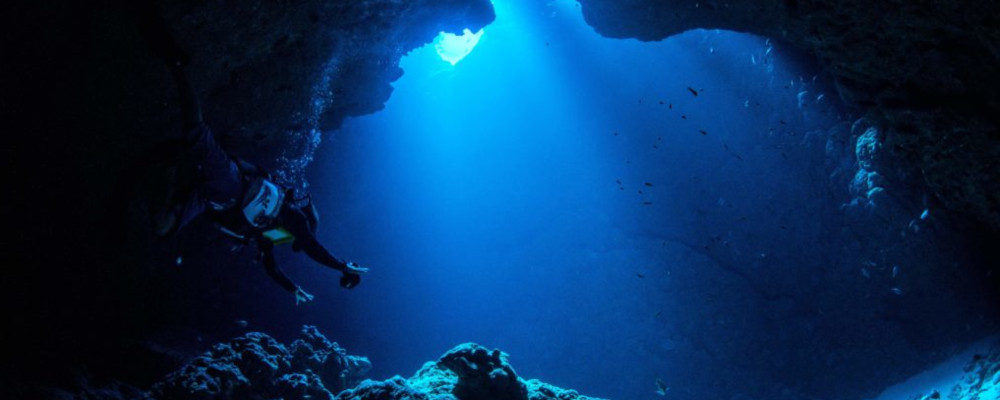The Hub launched with a core mission of getting Canadians thinking about the future. We’ve been stuck in the doldrums, pessimistic and polarized, for too long. To lay out a roadmap for the next 30 years of Canadian life, we asked our contributors to pinpoint the most consequential issue, idea or technology for the country in 2050. This series of essays by leading thinkers will illuminate Canada’s next frontier.
If the 19th century frontier was about land settlements and nation building and the 20th century frontier was about space exploration, then the 21st century frontier should be about oceanic discovery and Canada should be a global leader in its pursuit.
The case for oceanic discovery
Start with the case for oceanic discovery. Kate Moran, the president and CEO of Oceans Network Canada, a research organization based at the University of Victoria that tracks and monitors oceanic developments on the west and east coasts of Canada and the Arctic Ocean, has rightly characterized the world’s oceans as a modern frontier marked by great mystery and vast potential.
Oceans cover more than 70 percent of the Earth’s surface and play a crucial role in driving weather, regulating temperature, and ultimately supporting all living organisms. They’re also a vital source of commerce, food, transportation, and wonder. Renowned ecological economist Robert Costanza has described them as “humanity’s most important natural resources.”
Yet for all of our reliance on the ocean, more than 80 percent of this vast, underwater realm remains unmapped, unobserved, and unexplored. Much remains to be learned by exploring the mysteries of the deep.
Consider, for instance, that only 5 percent of the seafloor has been topographically imaged, which leaves 65 percent of the Earth’s surface (not counting land masses) unexplored. Or that more than two-thirds of oceans species are estimated to be unclassified or undiscovered, which means that there could be millions of life forms on the planet currently unaccounted for. Or even that there are as many as three million shipwrecks spread along the ocean floor around the planet, which date back thousands of centuries and may contain historical insights into previous civilizations as well as an estimated $60 billion in sunken treasure.
Unlocking these mysteries of the ocean ecosystems could therefore have big implications for our understanding of the natural world, as well as reveal new sources for medical therapies and vaccines, food, energy, and other commercial technologies.
The most significant consequences though undoubtedly relate to our understanding of how we’re affecting and being affected by changes to the climate. Oceans play a central role in regulating the Earth’s climate. They mediate temperature and shape weather events including rainfall, droughts, and floods. They’re also the world’s largest store of carbon — a 2019 study, for instance, estimated that between 1994 and 2007, oceans absorbed 34 gigatonnes of carbon dioxide, or 31 percent of what humans put into the atmosphere over the period.
This two-way relationship between the world’s oceans and climate and weather is bound to be even more fundamental in the coming decades as we grapple with the far-reaching effects of climate change. There’s already evidence that, as greenhouse gases trap more energy from the sun, the oceans are absorbing more heat, resulting in an increase in sea surface temperatures and rising sea level. Increasing levels of dissolved carbon in the oceans are also leading to greater acidity in seawater and in turn affecting the biodiversity and productivity of ocean ecosystems.
The upshot: a renewed commitment to ocean exploration as the twenty-first century frontier represents both an aspirational and highly practical undertaking. It can fulfill the innate human desire for scientific discovery and progress and help to inform better planning and policymaking on a wide range of issues related to the Earth’s origins, functioning, and climate.
Yet two main obstacles have impeded such progress on oceanic discovery. The first is politics. There’s been a sustained lack of political attention and resources focused on oceans in recent decades. It’s notable, for instance, that the Office of Ocean Exploration Research in the United States has an annual budget that’s ten times less than the NASA’s overall funding. The situation isn’t much different in Canada. According to a 2018 report by the Council of Canadian Academies, research funding for ocean science totaled less than $1 billion over the ten-year period between 2002-03 and 2011-12.
The second is physics. The ocean’s depths are characterized by zero visibility, extremely cold temperatures, and crushing amounts of pressure. A dive to the bottom of the Mariana Trench (located in the western Pacific Ocean), which is nearly 7 miles deep, involves 1,000 times more pressure than at the surface — that’s the equivalent of the weight of 50 jumbo jets pressing on one’s body. New discoveries therefore depend on different and better technologies to withstand these intense natural tests and ultimately reach unexplored parts of the ocean.
Overcoming these two separate yet related obstacles is crucial if we are to achieve greater progress on solving the mysteries of the world’s oceans and unlocking their potential.
The case for Canadian oceanic leadership
As the country with the world’s longest coastline — in fact, at roughly 202,080 kilometres it’s twice as long as Indonesia’s which is the second longest — Canada should lead in the pursuit of a new maritime frontier. Oceanic discovery can be a major source of scientific and technological progress, collective purpose, and national advantage.
Canada is one of only two countries bordered by three oceans and has among the most marine and freshwater resource capacity in the world. We also have pre-existing scientific advantages in a number of marine-related areas including ocean-climate interaction, biological, mineral, and energy resources, geological and hydrographic surveying, and the Arctic Ocean, as well as a sophisticated network of ocean science institutes and organizations across the country. Kate Moran has argued that these capabilities have given us “a deeper understanding of our oceans than any other country in the world.”
We also have a significant ocean-based economy. The ocean sectors contribute more than $30 billion annually to the national economy and account for close to 300,000 jobs.
This economic activity extends across urban centres and smaller towns and contributes to a wide range of employment along the skills distribution. It not only provides good, middle-class jobs (including for many who’ve been dislocated in the oil and gas sector in recent years), but it also holds out potential for even more high-skilled, high-wage opportunities in emerging areas such as marine biotech, bioprospecting, desalination, and seabed extraction.
Canada’s Indigenous communities have a long-standing relationship to the country’s ocean ecosystems. They’ve been a key source of food, employment, recreation, and commercial opportunity for these communities. The $1-billion acquisition of Clearwater Seafoods, Atlantic Canada’s largest seafood company, by a group of Mi’kmaq First Nations in late 2020 is a powerful sign of the ambition and opportunity available to Indigenous peoples in the ocean-based economy. It represents a major pathway for reconciliation, shared prosperity, and broad-based opportunity.
For these various reasons, oceanic discovery represents an exciting and dynamic opportunity for the country. In fact, Moran has even made the case that Canada could be an oceanic “global superpower.”
The question, of course, is what’s holding us back? Why do we underperform relative to other countries on the economic value derived from the ocean economy or the scientific impact from ocean-based research? There’s no doubt a number of factors but it’s worth highlighting three.
The first, according to the Council of Canadian Academies’ report, is a lack of vision. We don’t have a national strategy or overarching vision for ocean science which makes it difficult to prioritize needs, sustain policy and political attention, or capture the public’s imagination.
The good news is that the Trudeau government has just wrapped up public consultations this week on a new Blue Economy Strategy, which may ultimately provide such a coherent and connected vision. The key will be to balance the government’s emphasis on conservation and sustainability with the growth-oriented goals of technological progress, commercialization, and jobs.
The second is a lack of scientific coordination. The country’s network of more than 40 ocean science institutes and organizations operate as decentralized regional hubs that can lead to inefficiencies and impair the capacity for coordination or scale.
We’re not going to achieve frontier-like progress on the cheap.
That these different organizations draw primarily from public funding sources invariably risks succumbing to the common Canadian problem of “spreading the peanut butter too thin” in the name of political efficiency. Instead, funding agencies ought to be targeting scarce resources to the most promising and dynamic research projects with a greater degree of intentionality. This would help to test and then scale proven models and in turn enable a greater degree of coordination and collaboration across a smaller number of better funded ocean-based institutes.
The third is a sustained lack of resources. Not only is ocean science generally underfunded in Canada, but the Coast Guard’s fleet of research vessels is small and aging. Half of its oceanographic vessels and dedicated research icebreakers are now more than 25 years old and prone to breakdowns, higher costs, and operational delays.
We’re not going to achieve frontier-like progress on the cheap. It requires a new, sustained funding commitment for ocean science. The case, as outlined above, is that such public investments can produce significant benefits in the form of different and new commercial applications derived from oceanic research.
In this vein, the good news is the Canadian government has recently participated in a prize-based initiative to test new technologies for oceanic mapping, which offers a credible path forward in terms of new funding methods to support oceanic discovery. Prizes could be an effective tool to advance various oceanic-related objectives by incentivizing public and private action and fostering breakthrough technologies. As part of its forthcoming Blue Economy Strategy, Ottawa should dedicate significant resources to large-scale prizes in key oceanic areas (and related sub-areas) such as climate, energy, fisheries, and coastal communities.
Conclusion
As a species, humans are naturally inquisitive — our curiosity, desire for knowledge, and quest for adventure call us on to fulfill an admonition to discover and explore. This impulse has been filled in recent centuries by nation building and space exploration. But our current drift and decadence is in large part a reflection of a collective search for a new, modern source of inquisitiveness. We need a 21st century frontier.
Oceans can be such a frontier and Canada should lead in its pursuit. The outcome can be to unlock oceanic mysteries and draw on the vast maritime potential. It just requires a combination of coordination, scale, resources, and ultimately imagination.
A blue future is in our grasps if we have vision and purpose to achieve it.
Recommended for You

Paul W. Bennett: With AI taking over classrooms, it’s time to go old school again

Cam Linke: Closing Canada’s AI skills gap is key to driving our economic future

AI offers Canada an open opportunity

Howard Anglin: Mountainhead: Or Elon Musk must die




